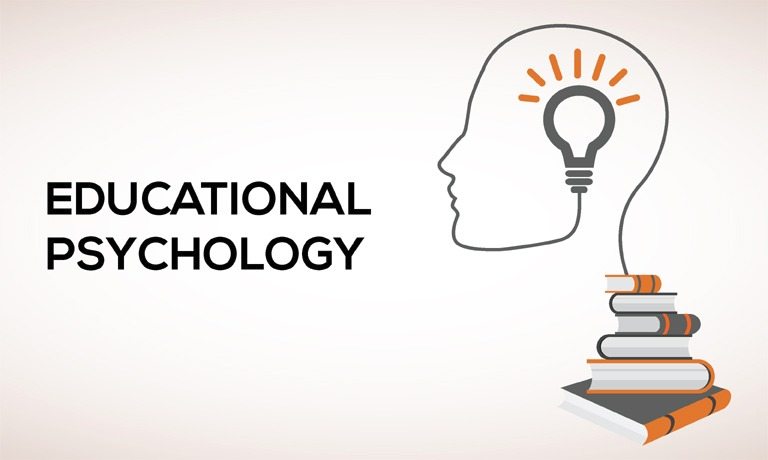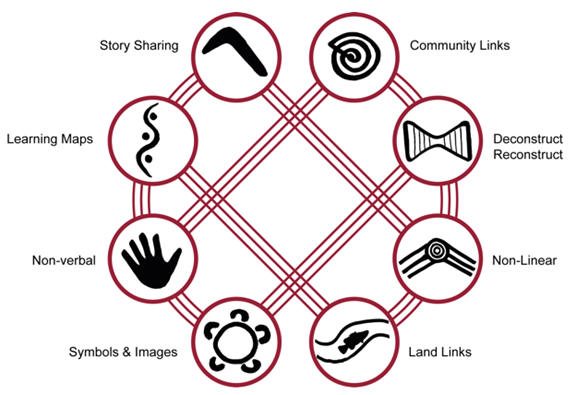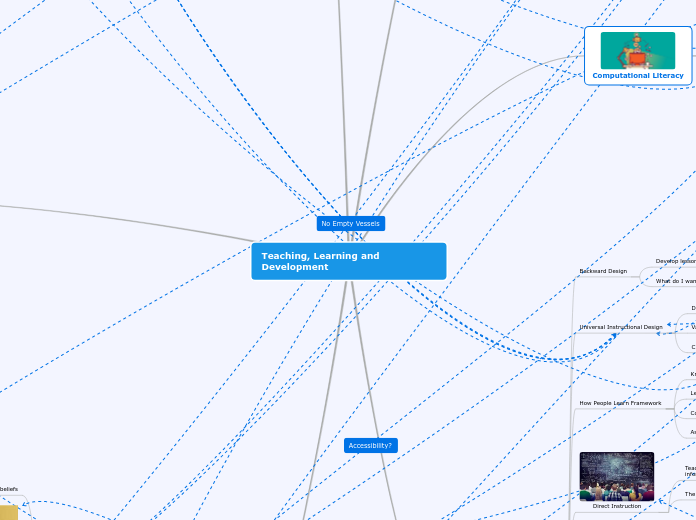Teaching, Learning and Development

Educational Psychologists
Piaget
Innate Drive to Organize
Schemas
Innate Drive to Adjust
Adaptation
Four Stages of Cognitive Development
Children Construct Their Own Knowledge
Vygotsky
Zone of Proximal Development
Scaffolding
Schwab
Bloom
Bloom's Taxonomy
Hierarchy of Intellectual Ability
Sternberg
Different Intelligence
Analytical/Componential
Creative/Experiential
Practical/Contextual
Erikson
Self
Life long process of discovering who we are.

Computational Literacy
Technology in the Classroom
Coding in the Classroom
Scratch
Mindstorms
Turtle Talk
Python
Arduino
LilyPad
Mindful Making
Copper Tape Paper Curcuits
Microbit
Makey Makey
STEM
Robotics
Problem-solving

Teaching Strategies
Backward Design
Develop lessons based on desired outcomes.
What do I want my students to learn?
Universal Instructional Design
Determine essential academic goals.
Varied instruction methods.
Clear expectations for students
How People Learn Framework
Knowledge-centredness
Learner-centredness
Community-centredness
Assessment-centredness
Direct Instruction
Teaching, often in a lecture format, small amounts of
information and providing lots of practice, often homework.
The traditional classroom.
Problem, Project, Inquiry-based Learning
Assessment
An ongoing process of gathering information about
students to gauge where they are with their understanding
of material.
Evaluations
Judges the quality of the work.
Counts towards a grade.
Standardized Testing
Pros
Compares many students in a population using the exact same methods.
A gauge for education governance to improve schooling
Cons
No room for exceptionalities
Differing instruction leads to different strengths
Tests are not an accurate indicator of intellect.

We can't teach, assess or plan for the "average" student.
The Myth of Average
Special Education
Accommodating the special learning needs of students with exceptionalism.
Specialized instruction based on needs of student.
People first language.

Bring on the Learning Revolution

Classroom Managment
Dynamic Classroom Managment
Relationships!!
Encourages student engagement in learning.
Optimize access to learning.
Development of social skills and self regulation.
Assists students with behaviour problems.
Classroom Behaviours
Teacher Behaviours to Diminish Student Behaviour Problems
Support and enhance learning
Learning Expectations
My Expectations from 5012
1. Always come prepared
2. Always try your best
3. Don’t be afraid to make mistakes
4. Participate and pay attention
5. Ask questions
6. Help your classmates
Classroom Expectations
My Expectations from 5012
1. RESPECT. Yourself, others and the classroom
2. Ask for what you need
3. Take responsibility for your actions
4. Cellphones out only when appropriate
5. No food or drink except water
6. One person speaks at a time

Development
Moral Development
Differentiate between right and wrong
Developmental Influences
Physical/Biological Development
Genetically Pre-determined
Cognitive/Learning Development
Primary education is important for success later in
secondary education.
Understanding basic math is essential to be successful in more
advanced math.
Math anxiety
Intelligence
The ability of acquire and apply knowledge and skills.

Nature and nurture

Do Schools Kill Creativity?
Different kinds of intelligence.
Innate Curiosity
Personal and Social Development
Self-esteem
Growth Mindset
Not Yet
Intelligence can be developed
The brain is a muscle that can be trained

Teaching Theories
Constructivism
All students come begin with their own beliefs
Letting Students Hack Their Lesson Plan
In science it is important to discover misconceptions and provide proof of another possibility.
Flipped Classroom
Socio-Cultural
Indigenous Ways of Learning
Sharing circle
Story Telling
Crafts and Art


Socio-economic Status
Culture Based Learning
Culturally Responsive Making
Cultural Identity vs. Individual
Reciprocal Determinism
Behaviour Influenced by...
The Individual
The Environment
The Behvaiour
Social Influence
Behaviourism
Behaviour is Learned From Environment
Learned from Role Models
Social Learning Theory
